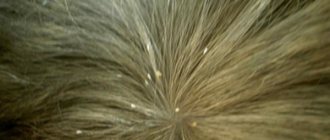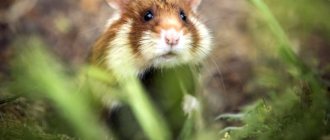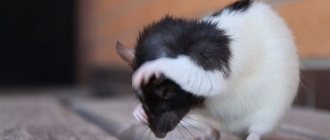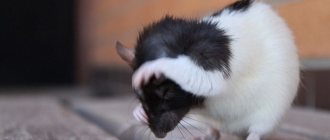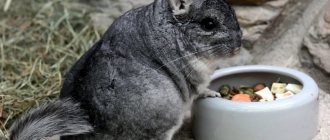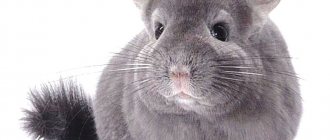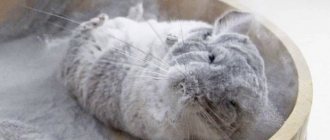- home
- Chinchilla
- Health
03/25/2019 If you periodically notice your chinchilla itching, you should not immediately sound the alarm. All animals do this sometimes, but if the animal bites itself and itches constantly, examine it. The condition of the rodent's skin determines whether it needs the help of a veterinarian, or whether a minor correction of care is sufficient.
If the chinchilla does not lose hair, it has clear skin without redness, blisters or peeling; it may itch due to the dry air in the room. In this case, limit bathing in the sand to once a week or use a humidifier. Otherwise, you need to show the animal to a specialist and carry out the treatment recommended by him.
Why does a chinchilla itch or bite itself and what to do about it?
If you periodically notice your chinchilla itching, do not immediately sound the alarm. All animals do this sometimes, but if the animal bites itself and itches constantly, examine it. The condition of the rodent's skin determines whether it needs the help of a veterinarian, or whether a minor correction of care is sufficient.
If the chinchilla does not lose hair, it has clear skin without redness, blisters or peeling; it may itch due to the dry air in the room. In this case, limit bathing in the sand to once a week or use a humidifier. Otherwise, you need to show the animal to a specialist and carry out the treatment recommended by him.
Colds in rodents
A very common disease in rodents. Almost every animal has had a cold at least 2-3 times. Most often, the cause of the disease is low temperatures and drafts, as well as dampness. The pet develops a runny nose, coughing, wheezing, sneezing, the animal becomes less active, sleeps a lot, and its coat loses its shine.
To treat a cold, you need to organize warmth and comfort, and include as many vitamins as possible in the rodent’s diet (primarily vitamin C). Do not disturb him when he is resting, as he needs rest at this time.
Symptoms of ectoparasite infection
Ectoparasites are parasites that live on the outer surface of the body of an animal or human. These include fleas, lice, and ticks. Chinchillas are infected with them relatively rarely due to their dense fur, but this possibility cannot be excluded until examination and testing are carried out.
The presence of parasites is detected by characteristic symptoms:
- the animal bites its fur, twitches and rubs its back against the wall;
- scratches the skin until it bleeds due to severe itching;
- the fur becomes brittle and falls out, especially on the head and paws, where it is less dense;
- bleeding ulcers and bumps appear on the skin;
- in serious cases there is swelling and suppuration.
Article on the topic: The rat is breathing heavily (opens its mouth, wheezes or grunts when breathing)
Attention! If treatment is not treated promptly, the pet may die from exhaustion or blood poisoning.
The main parasites of chinchillas
There are several types of ectoparasites that are found in chinchillas.
Fleas
These wingless insects jump high and cling to animal fur with their claws and bristles. The flea's body length ranges from 1 to 5 mm, and its mouthparts are designed to pierce the host's skin and feed on blood. They carry pathogens of dangerous diseases such as typhoid, plague, and hepatitis.
Chinchillas can become victims of cat, rabbit and rat parasites. When infected with fleas, the animal itches, hair falls out, and bites resembling warts appear near the face and on the limbs. Insects can be detected by parting the fur.
Lice and lice eaters
Both types of parasites live in the fur of mammals; the sizes of individuals vary from 0.5 to 10 mm. Lice feed on blood, and lice eaters feed on blood and skin particles. They reproduce quickly, laying white eggs - nits that stick tightly to the hair.
These insects also carry infections that are dangerous to people and pets. Their bites cause severe itching and anxiety in animals, as well as scratching on the skin.
Ticks
Chinchillas are parasitized by subcutaneous and ear mites that live in the upper layer of the epidermis. Because of them, bumps, peeling and crusts appear on the skin, the animal often itches and experiences severe discomfort.
The diagnosis is made after microscopic examination of the scraping. Curing a pet from ticks is quite difficult and is often possible only in the initial stages: first, the animal is cut, then washed in a 0.5% bromocyclene solution 4 times at intervals of 8 days.
How to get rid of parasites
Never try to cure a chinchilla of parasites on your own using popular pet medications. At best, this will not bring results; at worst, the wrong dosage will lead to poisoning. The veterinarian must make a diagnosis and prescribe the necessary medications.
Article on the topic: Eye diseases in chinchillas: suppuration, white discharge, cataracts and conjunctivitis
When treating fleas, a special collar for pets is successfully used. If your chinchilla is infested with insects and there are dogs or cats in the house, they should also be treated.
To get rid of parasites, be sure to disinfect the enclosure, change the filler, bedding and sand. It is also necessary to clean the entire apartment.
Colds
If a chinchilla sneezes, becomes lethargic, mucus comes out of its nose, and its body temperature is noticeably elevated, the animal has a common cold. The disease is not so harmless - improper treatment or untimely provision of assistance can result in death. Colds most often occur as a result of hypothermia or after being exposed to a draft. Treatment consists of a course of antibiotics for five days, as well as an abundance of succulent food rich in vitamins, additional ascorbic acid dissolved in warm water, an insulated house and complete rest.
Ringworm or fungus in chinchillas
If your pet itches and bites itself, the cause may be a fungal skin disease - ringworm, or ringworm. Signs that distinguish the disease:
- hair loss in certain areas;
- peeling of the skin;
- formation of crusts and red spots;
- sometimes discharge of pus from wounds.
A chinchilla usually easily tolerates the disease, but if it is neglected, the animal can become completely bald, and the fungus can also affect other organs.
Diagnosis is carried out using an ultraviolet lamp in a dark room: with dermatomycosis, areas of the skin glow green. This test does not detect ringworm caused by some types of fungi; in such cases, skin and hair samples are taken for microbiological analysis.
Factors that increase the risk of disease:
- chronic stress;
- avitaminosis;
- malnutrition;
- high air humidity;
- poor hygiene;
- contact with the vector.
Ringworm is an unpleasant disease, but relatively easy to treat. Therapy is prescribed by a veterinarian; drugs such as clotrimazole, lamisil, exoderil, etc. are usually used. There is a vaccine against fungus that is administered to chinchilla puppies after 6 months.
Ringworm is easily transmitted to humans, so a sick animal should be isolated and touched only with gloves.
Prevention of parasite infection in chinchillas
To prevent your pets from becoming infected with ectoparasites and fungi, you need to follow several rules:
- buy quality food and fillers;
- wash the cage and walking areas every day;
- Completely disinfect the cage at least once a month;
- keep chinchillas in a spacious enclosure;
- ventilate the room regularly;
- before adding a new resident to the enclosure, place him in quarantine for 1.5 months;
- wash your hands and change the clothes you came in from the street in if you are going to touch the animals;
- Include essential vitamins and minerals in their diet.
Article on the topic: The red-eared turtle's eyes are swollen and do not open, she is blind and does not eat: what to do, how to treat at home?
If tests do not show infestation with parasites, the chinchilla may chew out its own fur due to stress associated with moving or moving in with relatives. In this case, she is moved to a separate cage for several days, covered with a dark cloth. Other causes of biting include vitamin deficiency, allergies, and other diseases.
Preventing infections is easier than treating them. Follow the rules for caring for chinchillas, and the animals will be best protected from parasites. If you notice signs of infection in them, contact your veterinarian.
Answer: Itchy ears
I consulted with the veterinarian today - in principle, he said what I already understood: wipe with chlorhexidine and apply antibacterial drops. He confirmed my assumptions and specified the medications. I also suggested that the reason for such a rapid development of this scourge could be a change in diet (my girl has only lived with me for 3 days). And this morning I discovered that her poop has become small, I urgently need to improve her digestion.
Quick transition Diseases, Treatment of chinchillas Up
- Navigation
- Cabinet
- Private messages
- Subscriptions
- Who's on the site
- Search the forum
- Forum home page
- Forum
- All about chinchillas, general questions
- Who are Chinchillas? Newbie questions
- Care and maintenance at home
- Cages, display cases and their arrangement
- Food and treats, all about feeding and nutrition
- Features of behavior, observations
- Congratulations on your newborn!
- Breeding chinchillas - mating, pregnancy, childbirth
- Finally born! Photos of little chinchillas
- Bad feeling. Diseases and treatment
- Diseases, Treatment of chinchillas
- Veterinarians, veterinary clinics and pharmacies
- Colors and genetics
- Colors and genetics, general questions
- Basic colors, one gene
- Simple colors, two genes
- Complex colors, more than 2 genes
- About pleasant things
- I'm happy - I have a new pet, chinchillomania is progressing!
- We are such beautiful chinchillas!
- SALE OF CHINCHILLAS AND RELATED PRODUCTS (paid section)
- Rules for using this section. Read for everyone.
- Food and products for chinchillas from CHINCHILLA WORLD
- Chinchillas for sale from a breeder in Moscow Chinchillas aged 0 to 2 years
- Chinchillas aged from 2 years to 5 years
- Chinchillas aged 6 to 8 years
- Chinchillas aged 8 years and older
- Chinchillas are not for breeding, as pets
- Chinchillas for sale from a breeder in St. Petersburg
- Chinchillas aged 0 to 2 years
- Chinchillas aged from 2 years to 5 years
- Chinchillas aged 6 to 8 years
- Chinchillas aged 8 years and older
- Chinchillas are not for breeding, as pets
- Sale of chinchillas from a breeder in Russia (except Moscow and St. Petersburg)
- Chinchillas aged 0 to 2 years
- Chinchillas aged from 2 years to 5 years
- Chinchillas aged 6 to 8 years
- Chinchillas aged 8 years and older
- Chinchillas are not for breeding, as pets
- Sale of chinchillas from a breeder in Ukraine
- Chinchillas aged 0 to 2 years
- Chinchillas aged from 2 years to 5 years
- Chinchillas aged 6 to 8 years
- Chinchillas aged 8 years and older
- Chinchillas are not for breeding, as pets
- Selling chinchillas from a breeder in other countries
- Chinchillas aged 0 to 2 years
- Chinchillas aged from 2 years to 5 years
- Chinchillas aged 6 to 8 years
- Chinchillas aged 8 years and older
- Chinchillas are not for breeding, as pets
- Selling non-own breeding chinchillas
- Selling chinchillas from forum newcomers
- Products for chinchillas
- Cages, display cases from manufacturers and pet stores Moscow
- Saint Petersburg
- Other cities in Russia
- Ukraine
- Other countries
- Accessories for chinchillas from manufacturers and pet stores
- Moscow
- Saint Petersburg
- Other cities in Russia
- Ukraine
- Other countries
- Food, additives, treats
- Moscow
- Saint Petersburg
- Other cities in Russia
- Ukraine
- Other countries
- REQUESTS FOR PURCHASE, EXCHANGE, GIVEAWAY, etc.
- I will buy a chinchilla, purchase requests
- I'll give away a chinchilla, Exchange, Joint couples
- Delivery from beyond Bug.
- BIRD MARKET (free chinchilla sales section)
- Sale of chinchillas in Moscow and Moscow Region
- Sale of chinchillas in St. Petersburg and Leningrad Region
- Sale of chinchillas in other cities of Russia
- Selling chinchillas in other countries
- OTHER SALES (not chinchillas)
- Sale of used goods
- Sales of other pets
- PEOPLE AND ANIMALS.
- World of Lemurs Lemurs, all about Lemurs
- Sale of lemurs
- Hedgehog World
- Keeping and breeding hedgehogs
- Varieties of hedgehog colors
- Nutrition and feeding of hedgehogs
- Sale of hedgehogs
- My home zoo, pets.
- Sugar glider
- Rabbits: decorative, dwarf
- Guinea pigs
- Rats
- Hamsters, mice, degus
- Dogs
- Cats, cats, kittens.
- Other favorites
- Exotic animals
- My hobbies
- Music
- Vacations, travel
- Food
- Movies
- Painting
- Needlework.
- Photo
- Flowers
- Sport
- Programs
- Design
- Fishing
- Literature
- Collecting, other hobbies
- WORK OF CHINCHILLA WORLD (WWW.CHINWORLD.RU)
- Work of the Chinchilla World Forum Registration on the forum
- CHINCHILLA.RU
- Chinchillomaniac sites
- Website operation World of Chinchillas
- Additional Features
- Chat
- Gallery
- Arcade games.
What to do if your chinchilla has fleas
Today, many lovers of furry pets have a chinchilla in their home - a cute and quite active animal. This attractive animal has not only amazing beauty, but also a cheerful, friendly character. In addition, the chinchilla is very unpretentious in maintenance. According to many people, its unusually thick fur serves not only as an decoration for the animal, but also as an obstacle to the appearance of blood-sucking insects. This article will tell you whether chinchillas really have fleas.
Routes of infection
All warm-blooded animals on earth are susceptible to attacks by parasites such as fleas. Chinchillas are no exception. Even if the animal spends all its time in the apartment, this does not mean that it is protected from the pest. Fleas can appear in chinchillas for the following reasons:
- It is enough to have other pets in the house. One of the most common ways to infect a furry creature is to have a dog or cat in the house that regularly leaves the house.
- A person can also bring fleas into the house on outer clothing or shoes.
- It’s not for nothing that fleas are called jumping champions, since in search of their prey they are able to cover very long distances in a very short time.
- The most favorite habitats for fleas are basements and attics, from which insects can enter the house through the ventilation shaft.
- You should also not exclude the possibility that the chinchilla got fleas while at the pet store. Therefore, when buying an animal, you should pay attention to this nuance.
- Another source of infection for a furry rodent is hay, which is most often sold in pet stores or poultry markets. When placing an animal’s favorite treat in a cage, it is necessary to carefully inspect it.
Article on the topic: Newborn chinchillas (chinchillas): care, feeding and development (photo)
Does a chinchilla bite hurt?
Rodents are naturally cautious. They can bite reflexively, often not wanting to hurt a person at all.
A chinchilla may lightly bite the skin while “getting to know” a person.
For example, in the process of getting to know or communicating with a chinchilla, you may encounter the phenomenon of biting. It manifests itself in the fact that the animal slightly presses the skin with its teeth, but does not bite. So he can either evaluate a person or hint at what is unpleasant for him. Many chinchillas bite their owners' fingers while grooming. To prevent your furry pet from experiencing discomfort, it is better to get him a mate - the animals will take care of each other’s fur themselves.
A chinchilla can bite quite sensitively when feeding, which, again, can be associated with a “violent” temperament or bad manners. Sometimes bites occur accidentally.
In a stressful situation, an animal can cause severe pain. It happens that chinchillas bite very hard when trying to wash their eyes or perform any medical procedure. Therefore, when caring for a rodent, you need to be patient and careful.
Symptoms of infection
A parasite bite poses a serious danger to the health and even life of a chinchilla, since the pest is a carrier of various infections. And if there is an excessive accumulation of parasites in the animal’s fur, large blood losses are possible, leading to anemia. You can tell if your pet is bothered by blood-sucking insects based on the following signs:
- restless behavior;
- the animal itches very often;
- the injured area of skin turns into something like a wart;
- the presence of flea excrement in the animal’s fur, which looks like black grains;
- A particularly serious case is indicated by hair loss.
How dangerous are parasites for animals?
If fleas are not removed from a chinchilla for a long time, then the parasitism of insects leads to the development of a number of adverse consequences. Sometimes the saliva of pests causes allergies in rodents. The condition is manifested by swelling, redness, irritation, and itching in the bite area.
With constant scratching of the skin, the animal can cause a secondary infection, which will lead to the development of inflammation or purulent processes. In addition, fleas are carriers of a number of dangerous diseases, worms, ticks and other types of pests.
With prolonged parasitism of blood-sucking insects on the chinchilla's body, the animal may develop anemia.
With anemia, the rodent becomes inactive, stops playing, eats poorly, and sleeps restlessly.
How to treat a chinchilla for fleas
Treatment for fleas on an animal consists of treating the animal itself, its bedding and cage. As a disinfectant, you can use a solution made from vinegar and tar soap. The entire room must also be treated. In the absence of such comprehensive measures, it will not be possible to achieve a positive result - after a while, the fleas will attack the chinchilla again.
Sometimes, to treat chinchillas, they practice the use of antiparasitic agents intended for larger four-legged friends - dogs or cats. However, it should be taken into account that the dimensions of the furry animal are several times smaller, which means the dosage of the chemical must be different. Therefore, the use of anti-flea drops, sprays or powder in this case is not recommended. The best option is a collar for dogs or cats. It will not harm the pet, as it has a lower degree of toxicity.
Flea collar for chinchillas
Now you know that chinchillas have fleas. And if they are indeed detected, then ideally it is preferable to seek help from a veterinarian.
Answer: Itchy ears
Today I searched on the Internet for ear diseases in chinchillas. The only thing that is there is this: “As a result of severe pollution, inflammation of the external auditory canal can begin - otitis externa. Animals scratch their ears or rub their heads on the bottom of the cage. In severe cases, they keep their head tilted to the side. Brownish pus leaks from the ear canal, and in severe cases, this can lead to inflammation of the surrounding skin. The inflamed ear canal should be thoroughly cleaned with a cotton swab. However, under no circumstances should you use solvents containing alcohol, which are sold as so-called “ear cleaning solutions” and can further damage the epithelium of the ear canal. After thoroughly cleansing the ear canal, apply an ointment with fish oil and zinc using a cotton swab. After 48 hours, the ear canal is cleaned again and ointment with fish oil and zinc is applied.” I also read that ear mites do not occur in shinshas. That is, supposedly option 1 remains - that same otitis externa. But I couldn’t find anywhere where to get this ointment (with zinc and fish oil) and what to use to wipe it with (if you can’t use alcohol-containing solutions). Maybe someone knows what ointments this otitis media is treated with?
#6
Reviews
Chinchillas can have fleas. I verified this personally when I brought my pet to the veterinarian. He advised me to purchase a flea collar. Now my pet is cheerful, playful and doesn’t itch at all.
Article on the topic: How decorative rats reproduce: breeding and mating at home
In the summer we often had to go to the dacha, and we took our chinchilla with us. Although there were no other animals nearby, she somehow managed to pick up parasites. After which it began to itch very much. My wife saw the fleas in the cage when she was cleaning it. They took the animal to the veterinarian, where they dropped something on her neck, and that’s it - there were no more problems.
I never knew that chinchillas have fleas. An acquaintance convinced me that insects could not breed in such thick fur.
Preventive examination
As soon as the animal gets into your home, carefully examine its paws and ears. The fur on these parts of the animal’s body is much less dense than on the body, and parasites prefer to feed there. The skin is clean, no ulcers or scratches found, no insects? Everything is fine. Your animal is healthy.
You can tell that a chinchilla has fleas by indirect signs:
- The chinchilla experiences constant itching and cannot sleep peacefully. Losing weight.
- Dermatitis appears on the skin.
- The fur is falling off.
- Black specks are visible in the fur - flea droppings.
- Anemia occurs - the nose, gums and other mucous membranes turn pale, the animal weakens.
Attention. Many believe that chinchillas do not have fleas, since the thickness of their fur and love for swimming in fine sand prevent parasites from settling in their fur coat. But it is not so. They do not have their own parasites, but cat and dog fleas brought in from the street do not bypass any potential hosts.
Why does a chinchilla itch?
Occasional scratching is not a cause for alarm. Cats, dogs, and people itch periodically. Chinchillas also have the luxury of scratching themselves just because. However, if scabies occurs frequently, have your pet examined. If the chinchilla does not have bald spots, the skin is clean, without peeling, just limit bathing in the sand to 1-2 times a week; perhaps the skin is just a little dry, especially in winter, when the air in the room is dry. However, if there are symptoms of irritation, and the chinchilla chews out the fur, then the causes of the itching may be much more serious. In this case, you can’t figure it out without an experienced veterinarian.
Preventive measures to avoid the appearance of parasites
If you have other pets, be sure to treat them with drops or sprays. If there is an increased threat of infection, you can update your protection a week ahead of schedule to prevent infection. It is advisable not to bring old furniture and clothes into the house. Once every 1-2 months you need to carry out general cleaning.
You can use repellents to reduce the risk of infestation in your home. Fleas do not like the aroma of citrus essential oils and garlic. If there are no essential oils, you can spread the peel of an orange or lemon into hard-to-reach places, but the effect will be weaker.
Essential oils and citrus fruits will help you fight parasites.
Ringworm or fungus in chinchillas
The most common fungal skin diseases in chinchillas are mycoses caused by Trichophyton mentagrophytes and microsporia caused by Microsporum canis or Microsporum gypseum. Symptoms of these diseases may include the formation of round bald patches with reddened skin, sometimes covered with scabs. The diagnosis is made by scraping the skin from the affected area. Treatment is prescribed only by a veterinarian. The following drugs can be used in treatment:
- 1. Clotrimazole – 1% solution
- 2. Lamisil – spray
- 3. Exoderil - solution
- 4. Nystatin - crushed tablet is added to the sand
- 5. Fungi Stop is a veterinary antifungal agent that is rubbed into the fur.
- 6. Medical sulfur - rubbed into the affected areas, can also be added to the bath.
- 7. Antifungal tablets are prescribed by a veterinarian when the disease is difficult to treat only with external means. These may be griseofulvin or nizoral. The course and dosage are also only as prescribed by a specialist.
- 8. Vakderm F is a vaccine intended for the prevention and control of lichen. Age is a contraindication - chinchillas should not be injected until they are 6-7 months old.
Sources:
https://homjakam.ru/shinshilla/zdorovie/cheshetsya-ili-pokusyvaet-sebya https://apest.ru/blohi/vse-o-blohah/byvayut-li-u-shinshil-blohi/ https://gryzuny .com/pochemu-shinsilla-cheshetsya.html
Can a person become infected from a sick animal?
Humans can only become infected by fleas of the species Pulex irritans. Therefore, there is a chance of becoming infected with parasites, but it is very small. You may also simply be a carrier of these insects. But you should still be careful, as the flea can carry plague and rabies. Therefore, it is important to regularly carry out preventive measures.
Sources
- https://parazitdoma.ru/blohi/u-shinshilly-chto-delat
- https://klopkan.ru/blohi/vsyo-o-blohah/byvayut-li-blohi-u-shinshill/
- https://hlopklop.com/blohi/blohi-u-shinshill.html
- https://lifeinsect.ru/blohi-u-shinshilly.html
- https://homjakam.ru/shinshilla/zdorovie/cheshetsya-ili-pokusyvaet-sebya
- https://combat-dez.ru/prichiny-i-simptomy-poiavleniia-bloh-y-shinshill/
- https://stop-klopam.ru/blohi-u-zhivotnyh/chto-delat-esli-u-shinshilly-poyavilis-blohi
- https://pets2.me/bok/1629-kak-vyvesti-bloh-u-shinshilly.html
[collapse]
